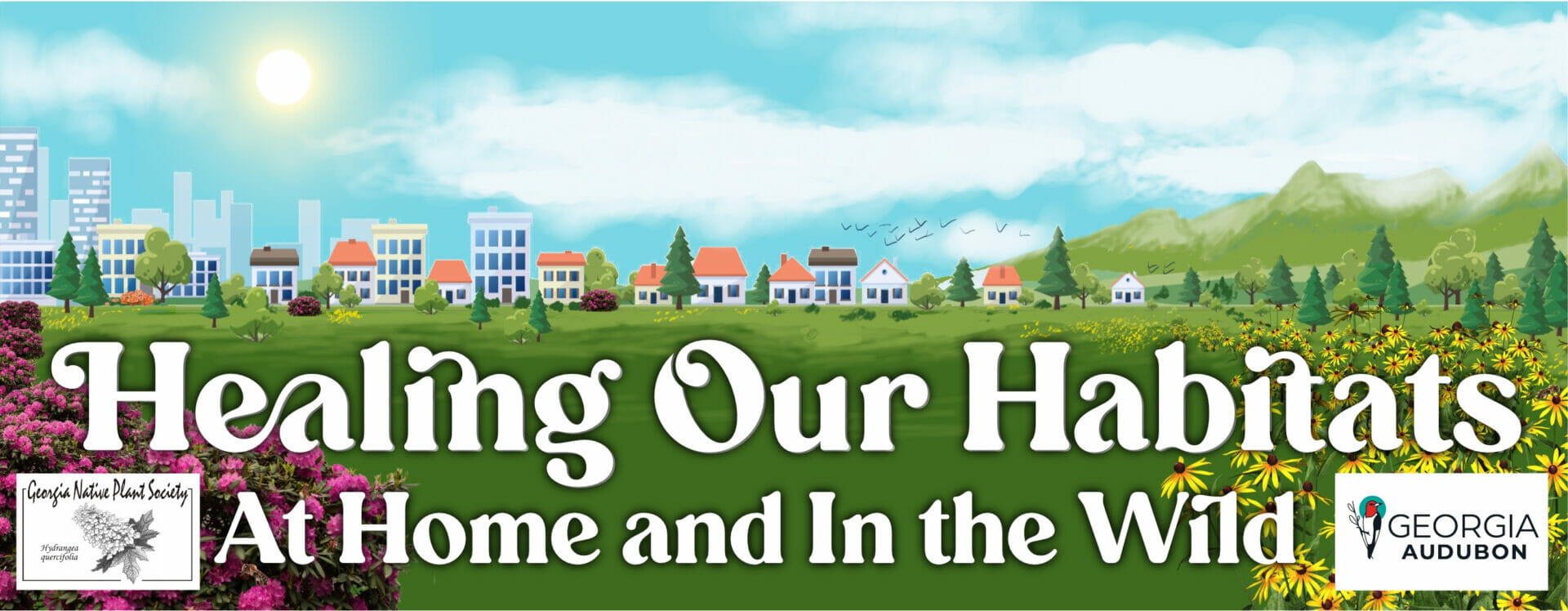The focus this year of the GNPS 2022 Symposium is Healing our Habitats: both at home and in designed landscapes, as well as conserving and restoring habitat in the wild. Through our actions and our designs, we have the ability to make a difference by getting more native plants into landscapes that have lost their connection with native ecosystems. Using native plants in our gardens, our patios, our community gardens, our city/county parks, and in our business landscaping allows each of us to help heal the ecosystem and to support native insects and birds. No space is too small to make a difference and we make a bigger impact when we work together.
At the same time, conserving plants and their habitats in the wild is equally important. Learn more about how conservation support in Georgia works and how we can help.
Saturday 9:00 am – 12 pm
Mincy Moffett – The Georgia Plant Conservation Alliance – a novel partnership that transformed plant conservation
Georgann Eubanks – Saving The Wild South: River Cane
Jennifer Ceska – Cues of Care in the Native Garden
Sunday 2:00 pm
Angela Burrow – Why Garden Certification Matters
Sunday 3:00-4:30 pm
Rick Huffman & Tradd Cotter – Applied Ecology: Approaches to Improving Landscapes and Ecosystem Health
Our GNPS 2022 Symposium event will be virtual again this year. To make the event more manageable, it will be spread across two days and each session will be recorded for future playback. GNPS is partnering with Georgia Audubon to present this program. The cost for GNPS and Georgia Audubon members is $10 per day ($20 total across the two days); the cost for non-members is $12 per day. You can register here, but note that registration is being handled by Georgia Audubon. When you get to the registration site, dismiss the pop-up asking you to login in if you are not also a Georgia Audubon member.
Speaker Bios:
Mincy Moffett works for the U.S. Fish & Wildlife Service as a Listing and Recovery Biologist in the Georgia Ecological Services Field Office. He is actively involved as a member of the senior leadership of the Georgia Plant Conservation Alliance (GPCA). He serves on the leadership team of the Southeastern Plant Conservation Alliance (SePCA. He volunteers his time establishing and maintaining Connect-to-Protect pollinator gardens for county parks and schools, as well as teaching in the STEM Lab of the local elementary school in Oconee County, GA. He has a Ph.D. in Plant Ecology and is retired from the GA DNR where he served as a Rare Species Botanist. His presentation will help attendees learn more about plant conservation efforts in Georgia.
Georgann Eubanks is the author of Saving the Wild South. She is a writer and Emmy-winning documentarian from Carrboro, NC. Her previous books focused on North Carolina, while in this one she “takes a wondrous trek from Alabama to North Carolina to search out native plants that are endangered and wavering on the edge of erasure. Even as she reveals the intricate beauty and biology of the South’s plant life, she also shows how local development and global climate change are threatening many species, some of which have been graduated to the federal list of endangered species.” Her talk will focus on river cane (Arundinaria gigantea), one of the 12 plants featured in her book.
Jennifer Ceska is an accredited Public Service and Outreach Faculty at the University of Georgia and has served for 27 years as Conservation Coordinator in the Science & Conservation Program of the State Botanical Garden of Georgia, Athens. Jennifer is passionate about connecting people and plants, is an animated teacher and presenter, and sees outreach as her mission and sharing joy over plants her calling. Ceska and colleagues launched the Connect-to-Protect program for Georgia, an initiative for schools, homes, patios, public landscapes, rights-of-way, and natural areas, getting native plants back on the land, creating beautiful displays that are ecologically relevant to wildlife. Her topic ‘Cues of Care in the Native Garden’ will help homeowners with their concerns over using native plants in an HOA environment.
Angela Burrow is a GNPS member and a postdoctoral researcher with the US Forest Service and University of Kentucky. She received her BS in Biology from Georgia Gwinnett College and her Ph.D. in Forestry and Natural Resources (wildlife ecology emphasis) from the University of Georgia. Her topic, ‘Why Garden Certification Matters,’ addresses the GNPS Habitat Certification program and the benefit it adds to creating native habitat in your landscape.
Rick Huffman (principal and founder of Earth Design) and Tradd Cotter (founder of Mushroom Mountain) will discuss how we can utilize the science behind mycoremediation and phytoremediation as integrated design tools to improve soil and water health and benefit ecosystems. Their presentation, ‘Applied Ecology: Approaches to Improving Landscapes and Ecosystem Health,’ will cover applied ecology and biomimicry as holistic approaches to landscape design that strive to create resilient living systems. Case studies and background theory will be discussed based on the presenter’s various past and current projects, spanning bioengineering, plant communities, soils, fungi and hydrology. Through these integrated processes and education, we can produce high quality, visually pleasing landscapes that solve problems and give back by supporting all trophic levels of landscape ecology.

